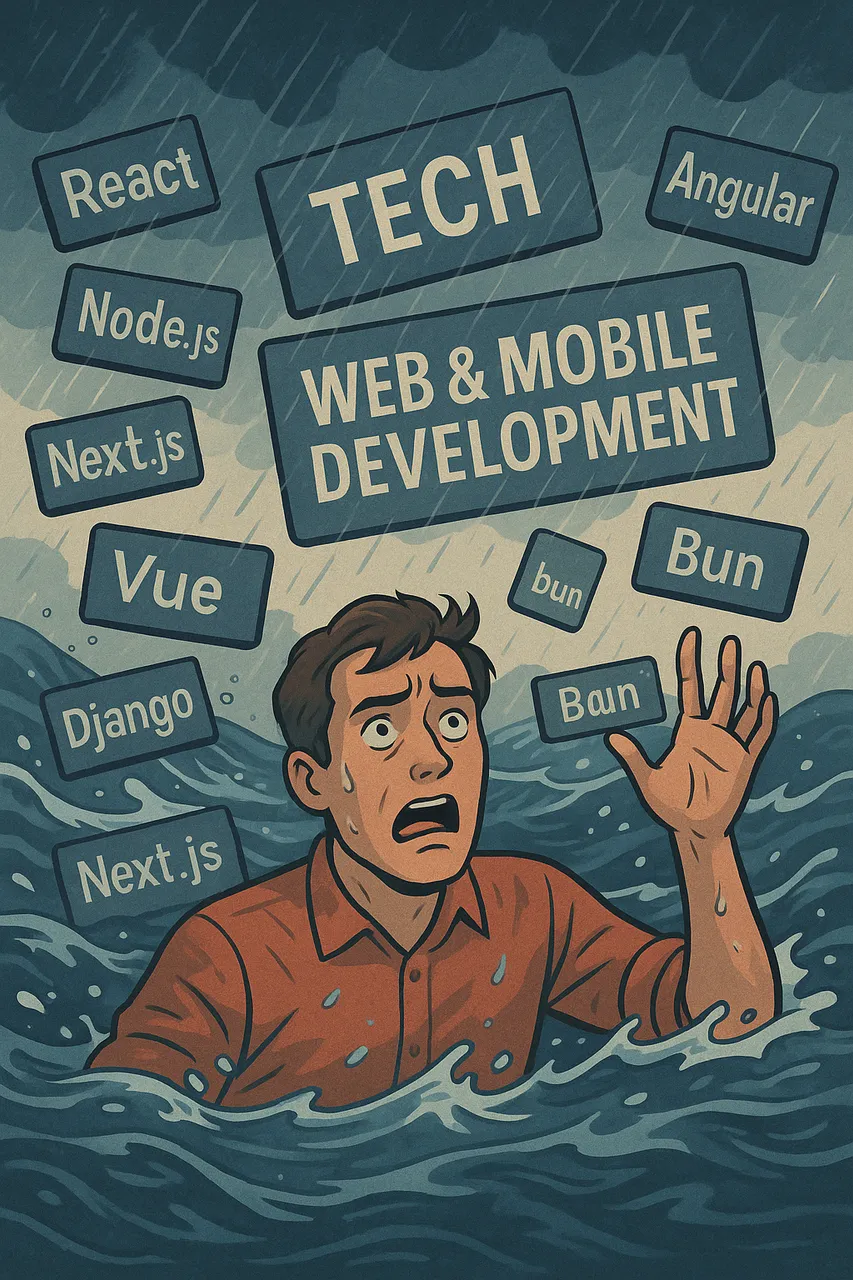🌊 Drowning in Tech: The Flooded Landscape of Web & Mobile-App Development

Image Generated by ChatGPT
The world of software development has always been fast-moving, but lately, it feels like a storm. New frameworks, libraries, languages, meta-frameworks, runtimes and full-stack solutions are pouring into the ecosystem at a dizzying pace. What used to be a relatively clear path: learn HTML, CSS, JavaScript, pick React or Angular, maybe pick up Node.js or Django, is now a labyrinth of choices.
Recently, I came across a blog that criticized Next.js, pointing out that it isn't necessarily an innovation, but rather a product strategically designed to serve Vercel’s business goals. That perspective struck a chord with me. Are we choosing technologies based on their merits, or based on the marketing and ecosystems built around them? Maybe the post was curated by someone who had no view of his own but copied it from a video or some other source.
But what really surprised me was discovering that React Router, a library I’ve long used just for client-side routing in React apps, now has a Framework Mode. That’s right, it can now be used to create full-stack applications with routing, data fetching, loaders, actions and server-side rendering. It’s not just a routing library anymore. It's evolving into a full-fledged React meta-framework. In case, you don't know what meta-frameworks are then, lemme tell you in simple words, "A meta-framework is a higher-level framework that builds upon or integrates other frameworks and libraries to provide a more easy, comprehensive and structured development environment.".
These shifts raise an important question:
Are We Innovating or Just Repackaging?
Many of the tools being released today solve similar problems in slightly different ways. Some promise better DX (developer experience), faster performance, or tighter integrations. But many feel like sidegrades, not upgrades. Worse, some tools emerge only to disappear within a year or two, leaving behind a trail of half-built projects and confused developers.
Let’s be real: the developer ecosystem is oversaturated.
Here are just a few trends that have emerged (or re-emerged) recently:
The rise of meta-frameworks like Next.js, Nuxt, SvelteKit, RedwoodJS, Remix and now React Router Framework Mode
Bun, a new JavaScript runtime aiming to replace Node.js and then Deno, replacing both in terms of zero-config for TS and security.
New backend-as-a-service options like Supabase, PocketBase, Appwrite
Constant churn in state management libraries like Jotai, Recoil, Zustand, Redux Toolkit, TanStack Query…
The growth of cross-platform tools like React Native, Flutter, Expo, Tauri, and Capacitor
Even CSS isn’t safe, (Oh yes it's been ages) Tailwind, UnoCSS, CSS Modules, Vanilla Extract, etc.
Then UI component Libraries (I forgot the actual count, The number is so big)
At this point, it feels like every library either becomes a framework or gets absorbed into one.
What’s Driving This Flood?
1. Open Source Capitalism
Companies like Vercel, Netlify, Shopify and even Meta aren't building tools purely for the community. They're building ecosystems. And ecosystems lead to lock-in and profit. A framework that makes deployment seamless with your cloud offering becomes a product disguised as tooling.
2. Developer Experience as a Differentiator
Everyone is chasing the perfect DX. But what is DX, really? Some say it’s instant refresh. Some say it’s having types everywhere. Others want zero config. But building for DX often sacrifices simplicity and transparency.
3. Fear of Missing Out (FOMO)
Developers (especially juniors) feel pressure to always learn the “next big thing.” This leads to jumping between stacks, abandoning long-term projects and burning out on tutorials (including me).
4. The YouTube + Twitter Effect
Every week, influencers hype new tech. "Why I'm switching from X to Y" videos get more clicks than "How I mastered the boring fundamentals." Attention spans shrink, and foundational knowledge takes a back seat.
So What Can We Do as Developers?
1. Build More, Switch Less
Choose a stack and finish things. Build projects to completion. Don’t jump ship just because a new framework hit Hacker News.
2. Learn the Fundamentals
No matter how many frameworks come and go, the core concepts remain: HTTP, JavaScript, DOM, state, data modeling, client-server architecture. Master these.
3. Treat Frameworks as Tools, Not Ideologies
It’s okay to like Next.js and Remix. It’s okay to dislike them. Don’t get emotionally attached to tech. Tools solve problems. If it solves yours, great. If not, move on.
4. Look Under the Hood
Try to understand how frameworks work, not just how to use them. Why does React Router now have a framework mode? What’s really happening behind the scenes in Vite or Bun?
Final Thoughts
It’s an exciting time to be a developer, but also an overwhelming one. The flood of technologies isn’t going to stop but you can choose how to respond.
Will you chase every wave?
Or will you learn to surf just the right ones?
Stay curious, stay grounded and don’t forget that great software is built not with the latest tools, but with clarity, patience and purpose
PS: Right Time for this. Second reason, I wrote this because a friend of mine suffers from high levels of FOMO.
@sagarkothari88 What do you think?